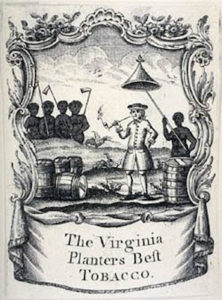
*Virginia, the first of America’s 13 colonies, was chartered on this date in 1606. This article briefly describes the settlers as the First Families of Virginia (FFV).
These were white-American planters and slaveholders in Colonial Virginia who were socially prominent and wealthy. Though Sir Walter Raleigh did not settle there, other families descended from England. They settled at Jamestown, Williamsburg, The Northern Neck, along the James River, and other navigable waters in the colony during the 17th century. These elite families generally married within their social class for many generations, and, as a result, most surnames of First Families date back to the colonial period.
Their migration occurred during the English Civil War and the English Interregnum period (1642–1660). Some royalists’ families recognized Charles II as King following the execution of Charles I in 1649; Charles II called Virginia his "Old Dominion," a nickname that stands today. The affinity of many early supposedly aristocratic Virginia settlers for the Crown led to the term "distressed Cavaliers," often applied to the Virginia oligarchy. Some Cavaliers who served under King Charles I fled to Virginia. FFVs usually refer to Virginia as "Cavalier Country." King Charles II offered these men rewards of land, etc., and most who had settled in Virginia stayed in Virginia.
Many of these English slave-holding settlers in Virginia were so-called "Second Sons." Second or third sons went to the colonies to make their fortune or entered the military and the clergy. Tidewater, Virginia, evolved as a society descended from second or third sons of the English aristocracy who inherited land grants or land in Virginia. They formed part of what became the southern elite in America. In Powhatan, Virginia, whites also interacted with Algonquian Native Americans. The Powhatan Confederacy was among the first, including its founder, Chief Powhatan, and his daughter, Pocahontas. There were no doubt mixed-race children born to lower-class colonists, Algonquians, and enslaved women.
Longstanding ties among families of the English elite were carried to the new colony, reinforced by marriage and other relations. For instance, there were ancestral ties between the Spencer family of Bedfordshire and the Washington family; a Spencer secured the land grant later purchased by the Washingtons, where they built their Mount Vernon home. These ties were common in the early colony, as families shuttled back and forth between England and Virginia, maintaining their connections with the mother country and each other. The ties among early Virginia families were based on marriage. The ownership of the best land was tightly controlled in a pre-Revolutionary War economy that depended primarily on tobacco and cotton production as commodity crops.
It often passed between families of corresponding social rank. The Virginia economy was based on slave labor as the colony became an Antebellum South slave society. The landed elite could keep a tight rein on political power, which passed orderly from family to family. Social mobility became more prominent in the North's more modern commercial economy. The elite's power was muted by newcomers who gained wealth in the market economy. The American Revolution did not cut ties with Britain’s social traditions. While some First Family members were loyal to Britain, others were Whigs who supported and led the Revolution. Most First Families remained in Virginia, where they flourished as planters and from the labor use and sale of slaves. During the 1800s, many FFV generations relocated into the cotton belt to start their plantations.
The American Civil War devastated the Virginia economy, emancipating all the slaves without compensation. Planters and small farmers were economically hurt, but the First Families maintained social and political leadership well into the next century. They adopted modern agricultural technology and co-opted rich "Yankees" into their upper-class, rural horse-estate society and more. In 1887, following the Reconstruction era after the Civil War, Virginia Governor Wyndham Robertson wrote the first history of Pocahontas and her descendants, delineating the ancestry of FFV families, including the Bollings, Clements, Whittles, Blands, Skipwiths, Flemings, Catlett's, Gays, Jordans, Randolphs, Tazewell, and many others. Excluded from this history were 'natural children,' mixed-race descendants of unions with slaves.
Families often used surnames as given names, as in the "Johns" of Johns Hopkins University. A mother's maiden name might be used as a "middle name" to document that part of the person's ancestry. For example, Lt. Col. Powhatan Bolling Whittle of the 38th Virginia Infantry, Confederate States Army, was an uncle of Matoaka Whittle Sims. In 1907, the Jamestown Exposition was held near Norfolk to celebrate the tricentennial of the arrival of the first English colonists and the founding of Jamestown. Preservation Virginia, formerly known as the Association for the Preservation of Virginia Antiquities, was founded in Williamsburg in 1889 to memorialize Virginia's history. In the 20th century, Preservation Virginia emphasized patriotism by highlighting the Founding Fathers who hailed from Virginia.